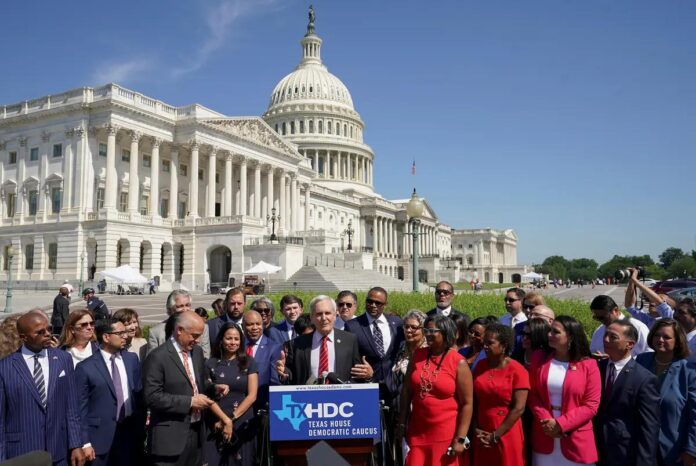Raga Justin and Emily Caldwell The Dallas Morning News
WASHINGTON — Facing criticism and accolades alike, three Texas Democrats took center stage Thursday during a congressional hearing on voting rights with their national call to action to stop Republican efforts to pass further restrictions.
The hearing put an even brighter spotlight on the battle that drove dozens of Democratic state legislators to flee Austin to Washington, where they want Congress to pass federal voting legislation.
Members of the U.S. House Civil Rights and Civil Liberties subcommittee grilled Texas state Reps. Senfronia Thompson of Houston, Nicole Collier of Fort Worth and Diego Bernal of San Antonio.
Questioning reflected partisan lines, with Republicans — including some from Texas — chiming in with blistering words for the runaway Democrats, accusing them of “cutting and running” from their duties back home.
“Today, in essence, we’re allowing and coddling people who should be at work in the state of Texas,” said Rep. Pete Sessions of Waco, the lead Republican on the subcommittee. “And yet we’re treating them as hometown heroes in Washington, D.C. I believe that they need to have their constitutional duties performed and be back home.”
Testimony focused on the nuances of House Bill 3, a Republican-backed bill that Democrats say would suppress the vote, particularly within communities of color.
House Republicans questioned the blowback over the bill’s restrictions, with some pointing out that the way HB 3 is written allows voters to submit complaints to election officials if they have evidence of suppressive measures at the polls. Fears that partisan poll watchers could intimidate voters have been a major Democratic talking point.
Texas Democrats, meanwhile, argued that voter fraud hasn’t been an issue in the state for years — making the bill a nonstarter.
“You heard about the Republican-appointed (Texas) Secretary of State who said that the 2020 elections were ‘smooth and secure,’ and yet we still found ourselves facing legislation to address the elections,” Collier said. Democrats frequently attempted to submit their own amendments to the bill but were ignored during the regular session, she added.
Rep. Pat Fallon, R-Texas, said the Democrats were “more like carnival barkers than serious legislators” and that their complaints were “hyperbolic in the extreme.”
Rep. Scott Franklin, R-Fla., was equally dismissive, telling the witnesses that Republicans don’t shirk their duties even when they are in the minority party.
“We don’t act like a bunch of spoiled cowards running away and refusing to vote when it’s clear we don’t have the numbers to get our way,” Franklin said.
“Even though Mr. Franklin may call himself a coward, he doesn’t have a right to classify me as one,” Thompson retorted moments later, saying she and her colleagues were in fact doing their jobs by leaving the state.
Texas Democrats brought up the cases of Crystal Mason and Hervis Rogers, two Black Texans charged with illegally voting while ineligible because of their parole status — a “simple mistake” that could land them long prison sentences, Collier said at one point.
Their cases illustrate the additional barriers for voters of color, Democrats say.
Notable House Democrats, including Rep. Alexandria Ocasio-Cortez of New York and Rep. Rashida Tlaib of Michigan, threw their support behind the Texas lawmakers during questioning.
“Let’s be clear, these Republican voter suppression bills took pains to avoid mentioning race, but they are aimed directly at American voters of color,” Tlaib said. “This is a blatant, disgusting attempt to return to Jim Crow, disguised by expensive Washington consultants and lobbyists.”
“They’re covering it up, but we all know what this is about,” Tlaib added.
State Rep. Travis Clardy of Nacogdoches was the only Republican from Texas to testify before the committee. His testimony focused on election integrity and security.
“To be sure, there is no assault on voting rights in Texas, but there is in fact a real danger posed to our democracy,” Clardy said. “Not the well-intentioned and reasoned provisions in HB 3 to better secure our election processes, but instead the growing threat of practices too long tolerated that deprive individuals of voting for the candidates of their choice.”




